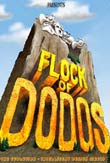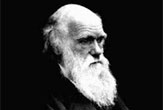
Dodo birds are famous for two things: being dumb and being dead. So when Randy Olson calls fellow biologists "dodos" in his new documentary "Flock of Dodos: The Evolution-Intelligent Design Circus," it's not meant as a compliment.
Dodos were flightless, odd-looking birds discovered by Portuguese sailors in the early 1500s on a tiny island in the Indian Ocean, just east of Madagascar. The birds were named after the Portuguese word for "fool" because they were fearless of humans and would walk up to hungry hunters who simply clubbed them to death and ate them. The birds were extinct by the 17th century, less than 200 years after their discovery.
Olson, a Harvard-trained biologists-turned-filmmaker, thinks the dodo's fate is a good metaphor for biologists in today's changing media environment.
"Natural selection teaches us that as an environment changes, species that can change with the environment will survive, while those that fail to change run the risk of extinction," Olson said in a telephone interview. "Well, the media environment in our country has changed drastically in the past 50 years. Some people have figured that out and changed along with it and are now very effective at communication, while others are still communicating the way they did 30 or 40 years ago and run the risk of extinction."
Evolution, intelligent design and rabbit poop
"Flock of Dodos" is a humorous examination of the debate between evolutionists and intelligent design (ID) proponents who argue that life is too complex to be explained by science alone.
The film features interviews with both Harvard evolutionists and ID advocates, including Michael Behe, a central figure in the movement.
Get the world’s most fascinating discoveries delivered straight to your inbox.
The 90-minute film also features Olson's mother, Muffy "Moose" Olson, as well as a flock of animated dodos running around doing nothing. Evolutionists play poker, and there's a lesson on the unintelligent design of rabbits, that have to eat their own poop to get nutrients from their food.
Olson himself is also a central character in the film. He provides a running commentary of the issues discussed and even weighs in on the debate. As a marine ecologist with more than 20 years of research experience, Olson ultimately sides with evolution and concludes that intelligent design is at best an idea stalled at the intuition stage.
"There isn't much to intelligent design," Olson told LiveScience. "These guys have this really deep-seated intuition that they can look at nature and see a designer at work, but the problem is they've failed to advance it to any kind of science so far."
Ways scientists can improve
Despite Olson's dismissal of intelligent design in his film, scientists come off looking even worse. During interviews, evolutionists appear stiff, condescending, inarticulate and arrogant.
Olson fears the elitism he sees among his colleagues could turn the public off to science. But it's not too late to change, he says.
To start, Olson thinks scientists should practice being concise and punchier, as opposed to long-winded and exhaustingly thorough, when talking about their work.
"It's like in mathematics when dummies present the proof of a formula in a hundred steps and the genius does the same thing in five," Olson said. "It's the exact same process [in science communication]. The dummy takes 12 pages to explain what everybody needs to know, while the great communicator does it in a page and a half."
The film makes clear that if scientists can't explain evolution in a way the public can understand, misconceptions that threaten the credibility of the theory, and which creationists can exploit, will persist. One such misconception, repeated again and again in the film, is that humans are not descended from apes, as the fossil record shows we are.
"I do not believe that we descended from apes," says one college student in the film. "I do not believe in any way, shape or form we descended from apes," says another.
Finally, one young man says, "I didn't believe that until I met my uncle who has more back hair than I have facial hair."
Audiences have responded particularly well to scenes in his film where Olson's evolutionist friends are playing poker.
"It's not scripted and doesn't have the standard talking heads," Olson explains. "They're very unpredictable moments. A few of the scientists are trying to explain things, and they're being cut off and interrupted and criticized. It's all very lively and fun and unpredictable."
In addition to concision and spontaneity, Olson thinks scientists could also benefit from injecting some humor into their talks and learning to be a little more humble when dealing with people who don't agree with their views.
Larger issue at stake
The central message of Olson's film is that if evolutionists don't learn to adapt and to beat ID proponents at their own game, then they and their message could go the way of the dodo.
But Olson thinks the stakes are even higher than that.
"The bigger issue in this whole thing is who will be the voice not just of evolution, but of science in general." he said. "Is it going to be scientists who are handicapped by their blind obsession with the truth? Or will it be public relations firms that know the importance of a good story but feel no constraints by the truth?"
"Flock of Dodos" has only been screened at a few universities and film festivals so far, but plans are underway for a larger scale release later this year. A trailer of the movie can be viewed here.
- Special Report: Evolution & Intelligent Design
- Scientists Find Cache of Dodo Bird Bones
- The Life of Charles Darwin
- How Evolution Works
SPECIAL REPORT
Evolution & Intelligent Design
PART 1
An Ambiguous Assault on Evolution
This Trojan Horse for Creationism has become very popular. But who is being duped? And what does it all mean for morality?
PART 2
Intelligent design is presented as a legitimate scientific theory and an alternative to Darwinism, but a close look at the arguments shows they don't pass scientific muster. So why are scientists worried?
PART 3
As evolution takes a beating, scientists remind us of the difference between fact, theory and belief.
PART 4:
Anti-evolution Attacks on the Rise
Each time the effort to introduce creationism into classrooms starts up again, so does legislation aimed against evolution. Learn about the rash of recent cases, plus a look at historically pertinent court cases.
PLUS
 Live Science Plus
Live Science Plus






